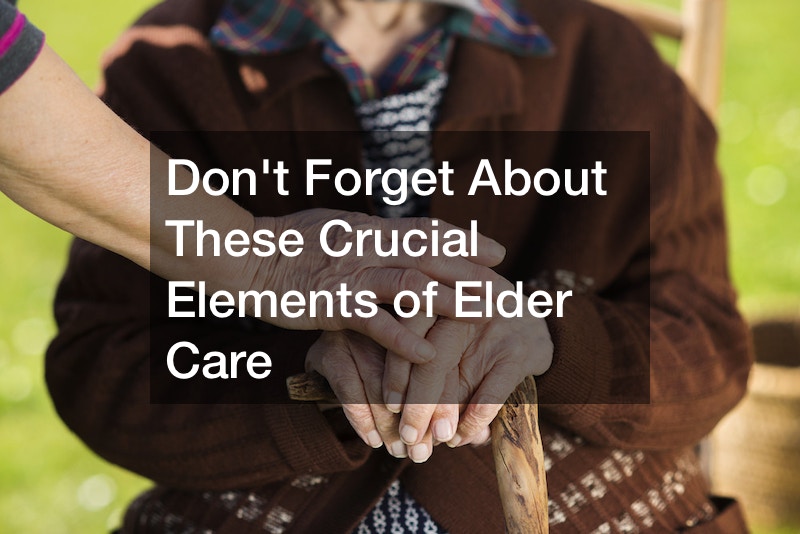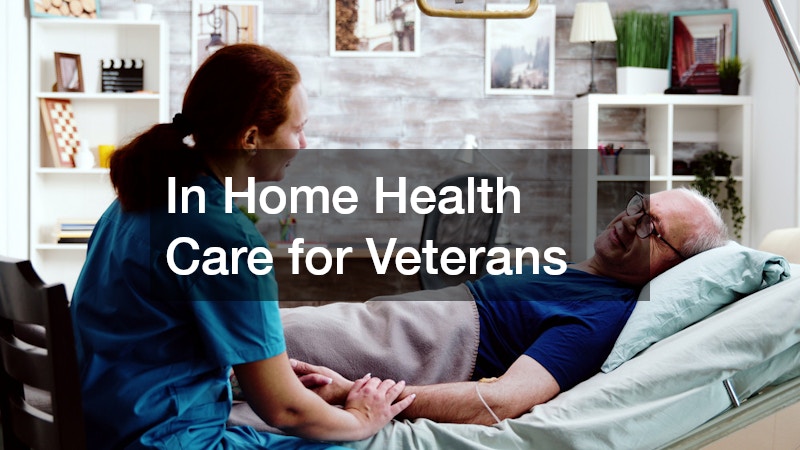Taking care of the elderly isn’t easy—there are so many important factors to keep in mind to ensure that the person in your care is safe and happy. From giving them the right medicine and making sure they actually take it, to helping them around with dignity, the many elements of elder care require dedication and passion from the caregiver. In this article, we’ll take a closer look at the most important elements you need to remember when you’re in charge of an older person.
If you’re preparing to take care of an elder or are already responsible for one, the following advice on the important elements of elder care will ensure you’re doing it the right way. Learn as much as you can from this article and add your own knowledge so you have a strong foundation of information to fall back on if things get a little difficult.
Personal Hygiene
An older person who is being taken care of by someone else needs extra attention when it comes to personal hygiene. If they require care from someone else, it’s very likely that they can’t wash themselves without assistance. And if they can, there may be many areas that they just can’t reach, no matter how hard they try. In addition to needing compassion for these elements of elder care, caregivers also need to have patience. Older people can be quite stubborn at times, especially if they feel a bit embarrassed about something.
You should start by arranging a bathing schedule for the older person. Depending on how they’re doing physically, it’s best to have a daily routine and let them shower or take a bath. If they’re unable to stand up or spend too much time away from their comfortable bed or sofa, a daily sponge bath is a good alternative. It can be tricky to wash elderly people who are spending most of their time in bed every day, so a schedule of two to three washes a week should suffice.
While you’re washing the elder, be sure to keep the mood lighthearted as this can be an embarrassing and uncomfortable situation. Try to strike up a natural conversation as a way of getting the elder to relax and focus on something else. You should also take the necessary safety precautions to ensure the older person is safe at all times.

Safety
Speaking of safety, this is one of the most important elements of elder care. You must, at all times, be vigilant to ensure that no harm comes to the person you’re caring for. It can be quite taxing and stressful, but avoiding any kind of injury is essential for older people who need the help and assistance of a caregiver. Older people experience a greater loss of bone density, weaker eyesight, and a decline in nervous coordination, and all these factors can work together to create dangerous situations in which they can slip and fall, getting hurt badly.
Even a fall that seems harmless at first can lead to serious problems, not to mention the impact it will have on the older person’s self-confidence. To avoid slips, always make sure that the environment is clean and tidy. There must be no tripping hazards or objects that can be missed by older eyes. Furniture must be moved around to accommodate the person you’re caring for, and throw rugs and floorboards that could cause them to trip must be fastened down or removed. Elderly people should avoid stairs completely if possible, and grab bars and handrails should be installed where applicable. Also, it’s important to ensure that all areas are accessible for a person who moves around in a wheelchair.
Mobility
Mobility is yet another one of the most important elements of elder care, since moving around is such an important part of existing. Allowing an older person to have a sense of independence and confidence for as long as possible will keep their hearts younger for longer. However, it’s not always possible to let older people move around as they wish because of the state of their bodies. It may be best to get a good wheelchair and allow the elder to learn to use it so they can move around more freely.
When you move the wheelchair user from it to the bed, you’ll have to be extra careful not to accidentally let them fall. This can be difficult, so make sure you practice and take all necessary safety precautions, like using lock brakes on the wheelchair and putting it as close as possible to the bed. If you have to assist an older person when they walk around, be vigilant and don’t get distracted. Don’t hover over the person, but be there so you’re nearby if they need your help. Teaching the elder you care for to use a cane or walking stick can give them a sense of independence while ensuring they’re less at risk of falling.
Housekeeping
Although housekeeping is one of the essential elements of elder care, it’s often not discussed with enough seriousness as is required. If you’re taking care of an older person, you may have a lot of tasks to take care of, and doing household chores could be near-impossible. It is a good idea to hire cleaning services to sort out tasks like washing the laundry, cleaning the toilet, and other similar tasks. You should still take care of tasks that need to be done daily, like sweeping, preparing food, washing the dishes, and organizing the mail.
As a caregiver for an older person, you’ll also have to take care of chores they can’t get to themselves, such as watering plants, caring for pets, and shopping for food and other necessary items. You’ll also have to ensure that the house is dust-free and sanitized if the elderly have any allergies. There may also be other specific tasks you’ll have to be responsible for, and this can vary from one elder to the next. For example, if you’re taking care of someone who enjoys painting, you’ll have to prepare their supplies and get refills as necessary. If the person collects a specific type of item, you may have to clean the collection and help them keep track of it.

Food
Most seniors need assistance with their meals. Whether it’s preparing the meals and making sure they’re packed with the nutrients an older body needs, shopping for the right ingredients, or cleaning up afterward, you’ll likely have to be very involved with the food preparation of the elder you’re caring for. You’ll have to know all about the senior’s food preferences, possible allergies, and the kind of vitamins and minerals they need the most. You should consult the senior’s physician to get a good understanding of their dietary needs and how you can make delicious meals that are good for them.
You can make the food preparation an opportunity to bond with the senior you’re caring for and involve them in the process. Plan and cook the meals together, and if the elder insists, consider eating with them to keep them company during dinner or lunch. You should also cook extra meals that can be frozen and heated in a microwave so the senior has easy access to food when you’re not there. Older people enjoy snacks as much as anyone else, but make sure you’re only providing them with healthy snacks. Fresh fruit, cheese, and any other snacks approved by their physician should be readily available to them.
Shopping and Errands
We’ve briefly touched on these elements of elder care as we discussed the other elements, but shopping and running errands can be so important that they warrant being discussed separately. Taking care of an older person is a full-time job on its own, and adding to that the responsibility of errands and shopping as well can be quite overwhelming. That’s why it’s best to plan ahead and have a strict schedule. That way, you can take care of grocery shopping and have someone else keep an eye on the elderly while you’re gone, for example.
It’s also a good idea to involve the senior in the tasks you’re taking care of so they don’t feel so helpless or as if they’re a burden. If possible, take them with you when you go shopping and treat them to a milkshake afterward. Or plan a trip to the post office so they can get out of the house for a bit. You can also involve the senior in daily chores and errands if their health allows it.

Medication
When it comes to elements of elder care that could impact their lives, medication is one of the most important. There are so many factors to consider when it comes to properly medicating elderly folks and keeping them as healthy as possible. Not only do you have to make sure you’re giving them the right dosage every time, you also have to ensure you’re on the appropriate schedule and give them the right kind of medicine. If there are any side-effects, you’ll need to report them immediately and take the senior to the hospital for emergency care, if necessary.
If the senior in your care has to go for an eye exam, have therapy assessments due, or has to visit a dentist or go for a general physical exam, you’ll have to go with them. It’s important that you’re always involved and up to date with their health reports.
Some elderly people will need more specialized care, such as the input of an audiologist, a trip to cancer centers, or the advice of a chiropractor. You need to be there no matter what medication and health check-up the elder needs, so you always know what their physical condition is and take care of them properly.
Exercise
Proper exercise and staying in good shape are important elements of elder care that you’ll have to take responsibility for ensuring the elderly person you’re caring for is in good hands. The importance of exercise increases with age, but the type of exercise that’s appropriate also changes. You’ll need to understand the physical condition of the person you’re caring for, so you can recommend the right kind of exercise. Don’t expect too much from them, but you also can’t let them sit around and be static.
There are three types of exercises you can incorporate into the senior’s schedule, and this includes strength training, balance activities, and endurance training. For endurance, you can opt for water aerobics, cycling, or dancing, as appropriate. Strength exercises can involve mild weight training and balance exercises can be focused on Tai Chi or yoga. Remember that safety comes first, so take it easy and slowly let the senior build up a routine. Make sure they stretch before and after, and keep an eye out for possible injuries.

After Surgery Care
Taking care of the elderly after surgery can be challenging, and requires a lot of patience, but it can be highly rewarding. Recovery after surgery becomes more complicated with age, so you’ll have to be prepared in advance. Make sure the elder receives enough nourishment before the surgery and knows what the surgery entails. Make sure you’re informed about any Medicaid legal service that needs to be sorted out before the surgery. In the same way, make sure to understand what type of health insurance your loved one has. Options like Jericho Share Health Insurance can help alleviate some financial burden.
If the senior has any concerns, discuss them with them. You should have a good understanding of the surgery yourself, and know how to take care of a patient in recovery. Their home should be a comfortable place that promotes healing, so sort out any housekeeping errands during the surgery so you’re free to assist the senior as necessary. Give them the medicine they need to take afterward and don’t let them be too active while they’re recovering.
Now that you know more about the essential elements of elder care, you can rest assured you’ll be better prepared to be responsible for an older person. If this isn’t enough and you need a bit more information or encouragement, you should consider spending time with homecare services and getting an understanding of what homecare entails. Good luck!


